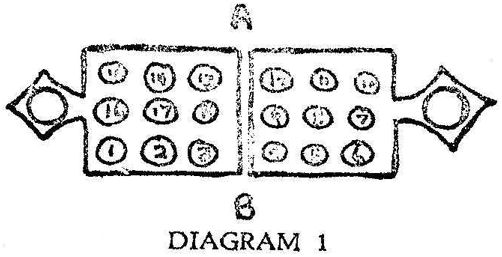The Ethiopian Game of Gobeta
Harold Courlander
Negro History Bulletin, Washington, D.C., No. 7, Oct. 1943, pages 21-23.

[Page 21 ] Throughout Eritrea and northern Ethiopia, and along the edges of the Sudan, thousands of Africans play a game known to them as Gobeta. It is played upon a board, similar to the game of Wari. Deep into the Sudan Gobeta disappears, and Wari1 and Della2 take its place. From there on westward Gobeta seems not to he known. Throughout the Sudan, the Congo, and Northwest Africa only the Wari board of two rows is commonly seen. Usually it has sixteen pockets. East of Eritrea and Ethiopia, in Somaliland, people play a Wari-like game on a board with two rows and only twelve pockets. Gobeta appears to be a special game of the Coptic people of the Abyssinian region. It requires a playing field of eighteen pockets, arranged in three rows of six.The playing field is made up of two boards of nine holes each (arranged in a 3-square pattern) which is placed end to end. On the outer end of each board is a large extra pocket used as a reservoir for winnings. The two boards are generally fastened loosely with leather thongs, so that they may be folded together book-wise and carried with a handle. They are carved to a formalized pattern, the large pockets for winnings representing crosses, which are present on nearly all Coptic art. The game pieces are usually buckshot or seeds, although even stones are often used.

On certain streets of Addis Ababa Gobeta holes have been carved in the curb stones, where children frequently sit to play. The curbstone boards most often are of the two-row type, though the games played upon them are the same as those identified with the three-row boards. The wooden boards are everywhere considered valuable, and in Eritrea they are even rare. Families keep them for generations and are reluctant to part with them. A Gobeta board is a kind of symbol of family life, a hearth around which the old and young gather. When a young man marries, his father may carve him a board, and long hours are whiled away by the bride and groom playing Gobeta, which seems to have special relevance to the nuptial holidays. I asked several men why they owned no Gobeta boards, and some of them replied simply, "My father never made me one."
Many versions of the game are known, but in Tigrai Province five distinct variations are played: Abalalà, Sulus Aidi, or Awagagà, Sulus Nishtaw, Lamè Uwèièdèt, Kwahilka Aitidikus, or Shèdan.
[Click on a title below for instructions on how to play each of these Gobeta variations.]
Sulus Aidi, or Awagagà
Kwahilka Aitidikus, or Shèdan
Notes
- Also called Mungala. A distinct variation called Betchà is played by the Cunama of western Eritrea.
- Played in the sand on a field of thirty-six pockets arranged 6-square.
Last update January 8, 2010
